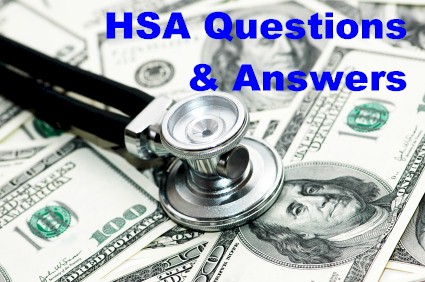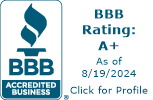 Q. What is a Health Savings Account?
Q. What is a Health Savings Account?
A. An HSA works like an IRA, except that money is used to pay health care costs. Participants first enroll in a relatively inexpensive high deductible insurance plan. Then, a tax-deductible health savings account may be opened to cover current and future medical expenses. The money deposited, as well as the earnings, are not taxable. The funds can then be withdrawn to cover qualified medical expenses tax-free. Unused balances roll over from year to year.
Q. Who can qualify?
A. Everyone (not just self-employed or small businesses) with a qualified high deductible insurance plan is eligible for a tax-deductible HSA.
Q. What are some of the main benefits of an HSA?
A. There are many benefits, but here are the highlights:
- Tax-deductible contributions
- Tax-free earnings
- Tax-free distributions
- Portability as beneficiaries can take assets from job to job and into retirement
- Withdrawals for qualified medical expenses are tax-free
- Withdrawals after age 65 for any purpose are penalty-free
Q. Can I get an HSA with any high deductible health insurance plan?
A. No, the plan must meet government requirements to be considered an HSA qualified health insurance plan. Plans that are HSA qualified are typically clearly labeled as such. Get a free quote on an HSA qualified health plan.
Q. Are there any first-dollar benefits?
A. Affordable Care Act compliant HSA qualified health insurance plans offer first-dollar benefits for federally mandated preventative care, not subject to deductible. These often include things like and routine adult and well child physicals, immunizations, pap exams, mammograms, PSA exams and more.
Q. What are the tax advantages of contributing to an HSA?
A. Contributions to HSAs are made on a tax-deductible basis, meaning you can deduct them from your gross taxable income. You can invest contributed amounts as you choose, and those investment earnings accumulate tax-free until you need the money. Once you decide to make a withdrawal, that’s tax-free too, as long as the funds are used to pay for qualified medical expenses, including health insurance deductibles, most payments for medical services, prescriptions and dental and vision care. The penalty for a non-qualified withdrawal from an HSA prior to age 65 is 20%. The penalty no longer applies after age 65, so you are then free to use your savings as you like.
Q. How does the tax reporting work for Health Savings Accounts?
A. The IRS requires that banks report HSA activity to you and the IRS. Each year, by the end of May you should receive Form 5498-SA reporting your contributions for the previous calendar year. This allows any contributions made after January 1st for the previous tax year to be included. Remember that contributions can be made until April 15th or the business day following, for the previous calendar year. If you made distributions in the previous calendar year you will receive a form 1099-SA.
Q. If I get an HSA plan and am 55 years old or older are there any special “catch up” benefits?
A. Yes, in addition to the normal contribution levels HSA’s have “catch up” provisions. Catch up contributions for individuals who are 55 or older are $1000. Historically, they increased from $700 in 2006 to $800 in 2007, to $900 in 2008 and to $1000 in 2009 and for all subsequent years.
Q. If both spouses are 55 and older, can both spouses make “catch-up” contributions?
A. Yes, if both spouses are eligible individuals and both spouses have individually established an HSA, each in their own name. If only one spouse has an HSA in their name, only that spouse can make a “catch-up” contribution.
Q. If I get a qualified HSA health insurance plan and HSA mid-year how are HSA contributions pro-rated?
A. Individuals who are eligible individuals on the first day of the last month of the taxable year (December for most taxpayers) are allowed the full annual contribution (plus catch up contribution, if 55 or older by year end), regardless of the number of months the individual was an eligible individual in the year. For individuals who are no longer eligible individuals on that date, both the HSA contribution and catch up contribution apply pro rata based on the number of months of the year a taxpayer is an eligible individual. If a contribution exceeds the pro-rata amount you must maintain HSA eligibility for the next calendar year or the contribution exceeding the pro-rata limit becomes taxable and the 20% additional tax rule for premature distributions will apply.
Q. Does the account need to be funded before year-end?
A. You have until the tax-filing deadline of the following year to make a contribution for the previous tax year.
Q. Do my HSA contributions have to be made in equal amounts each month?
A. No, you can contribute in a lump sum or in any amounts or frequency you wish. However, your account trustee/custodian (bank, credit union, insurer, etc.) can impose minimum deposit and balance requirements.
Q. Can medical expenses incurred before the HSA was established be paid from the HSA?
A. No. Individuals who establish an HSA can use the HSA to reimburse qualified medical expenses incurred on or after the first day of the first month that they are covered under an HDHP.
Q. Can I claim both the “above-the-line” deduction for an HSA and the itemized deduction for medical expenses?
A. You may be able to claim the medical expense deduction even if you contribute to an HSA. However, you cannot include any contribution to the HSA or any distribution from the HSA, including distributions taken for non-medical expenses, in the calculation for claiming the itemized deduction for medical expenses.
Q. Can I use the HSA funds for my spouse or dependents?
A. Yes, withdrawals from HSAs are tax-free if they are used to pay for qualified medical expenses of the account holder, his or her spouse, or dependents.
Q. What is the penalty for non-qualified withdrawals before age 65?
A. The penalty for a non-qualified withdrawal prior to age 65 is 20%. Non-qualified withdrawals are taxable both before and after age 65. Withdrawals from HSAs are tax-free if they are used to pay for qualified medical expenses. After age 65 they should be taxed as ordinary income.
Q. Can people decide to have his/her HSA custodial account administered by a bank/institution of their own choosing?
A. Yes, you can have a qualified medical plan and decide to have his/her HSA account with another HSA administrator.
Q. What happens under the HSA law once someone becomes eligible for Medicare?
A. Once a person becomes Medicare eligible, he/she can typically no longer contribute to an HSA. However, he/she can use the accumulated funds to cover qualified medical expenses not covered under Medicare or his/her supplemental plan.
Q. Since deposits can be made by anyone on behalf of the account beneficiary, who can legally take the tax deduction?
A. Contributions made by a family member on behalf of an eligible individual to an HSA are deductible by the eligible individual in computing adjusted gross income.
Q. Are health insurance premiums considered a qualified medical expense?
A. No, health insurance premiums are not qualified eligible expenses except for the following scenarios: qualified long term care insurance, COBRA and health care coverage while receiving unemployment compensation. Funds can also be used to pay for Medicare Part A or B premiums, but not Medicare supplement premiums.
Q. Who can deduct premium payments from their taxes?
A. The self-employed can deduct their premiums. You can not pay your HDHP premiums with your HSA.
Q. If a client files an extension on his/her taxes, would he/she have extra time to contribute money into his/her HSA custodial account?
A. The client could contribute until the tax filing deadline. An extension does not affect the amount that a client can contribute to the HSA.
Q. Can clients roll funds from an IRA or 401k into an HSA?
A. You cannot directly roll funds in a 401(k) or other retirement plan into an HSA. You can withdraw funds from one of these accounts, pay applicable taxes (and penalties) on the amount you withdraw, and then use the remaining funds to make a contribution to your HSA. However, the amount you contribute to your HSA is still limited by the annual contribution limits.
For 2007 and forward, you may make a one-time transfer for IRA funds to an HSA. The amount of the IRA transfer reduces your HSA contribution for the year. If you fail to remain an eligible individual for 12 months after the month of the transfer, the amount of the transfer is included in income and subject to a 10 percent additional tax. Consult with your tax professional before doing this for your own protection.
Q: If an unmarried insured has single coverage, can HSA funds be used to pay for qualified medical expenses for his/her dependents?
A. Yes.
Q. Can minors have a “self-only” HSA?
A. According to the Treasury guidance, minors who are claimed as a dependent on another person’s tax return are not eligible to have a “self-only” HSA. They can be covered by their parent’s or guardian’s HSA plan.
Q. Does a person buying an HSA need to have “earned” income in order to deduct the contribution? Can they deduct it against “unearned” income i.e. pension, investment, etc.
A. An individual who has less earned income (even no earned income) than his/her HSA contribution may still take the full above-the-line deduction.
Q. How to Find the Best HSA Qualified Health Plan
A. No one insurance company is the best in all situations. Things like age, zip code, tobacco use and anticipated claims for the policy year will influence which plan will be best for your specific needs.
Q. What are the maximum contribution limits in 2024?
A. Annual contribution limits for 2024 are capped at $4,150 for an individual or $8,300 for a family.
Q. What are the maximum contribution limits in 2023?
A. Annual contribution limits for 2023 are capped at $3,850 for an individual or $7,750 for a family.
Q. What were the maximum contribution limits in 2022?
A. Annual contribution limits for 2022 were capped at $3,650 for an individual or $7,300 for a family.
Q. What were the maximum contribution limits in 2021?
A. Annual contribution limits for 2021 were capped at $3,600 for an individual or $7,200 for a family.
Q. What were the maximum contribution limits in 2020?
A. Annual contribution limits for 2020 were capped at $3,550 for an individual or $7,100 for a family.
Q. What were the maximum contribution limits in 2019?
A. Annual contribution limits for 2019 were capped at $3,500 for an individual or $7,000 for a family.
Q. What were the maximum contribution limits in 2018?
A. Annual contribution limits for 2018 were capped at $3,450 for an individual or $6,900 for a family.
Q. What were the maximum contribution limits in 2017?
A. Annual contribution limits for 2017 were capped at $3,400 for an individual or $6,750 for a family.
Q. What were the maximum contribution limits in 2016?
A. Annual contribution limits for 2016 were capped at $3,350 for an individual or $6,750 for a family.
Q. What were the maximum contribution limits in 2015?
A. Annual contribution limits for 2015 were capped at $3,350 for an individual or $6,650 for a family.
Q. What were the maximum contribution limits in 2014?
A. Annual contribution limits for 2014 were capped at $3,300 for an individual or $6,550 for a family.
Q. What were the maximum contribution limits in 2013?
A. Annual contribution limits for 2013 were capped at $3,250 for an individual or $6,450 for a family.
Q. What were the maximum contribution limits in 2012?
A. Annual contribution limits for 2012 were capped at $3,100 for an individual or $6,250 for a family.
Q. What were the maximum contribution limits in 2010 and 2011?
A. Annual contribution limits for 2010 and 2011 were capped at $3,050 for an individual or $6,150 for a family.
Q. What were the maximum contribution limits in 2009?
A. Annual contribution limits for 2009 were capped at $3,000 for an individual or $5,950 for a family.
Q. What were the maximum contribution limits in 2008?
A. Annual contribution limits for 2008 were capped at $2,900 for an individual or $5,800 for a family.
Q. What were the maximum contribution limits in 2007?
A. Annual contribution limits for 2007 were capped at $2,850 for an individual or $5,650 for a family, even if your deductible is less!
Health Savings Accounts are the biggest advancement in health care financing in years is available to anyone in Colorado with our HSA qualifying medical plans! Call Colorado Health Insurance Brokers at 800-416-4481 for more information and a free quote or Get a free instant HSA quote.
MORE HSA RESOURCES >>
HSA OVERVIEW
HSA HIGH DEDUCTIBLE HEALTH PLANS
HSA BANKING OPTIONS
HSA QUALIFIED EXPENSES
HSA – ALTERNATIVE MEDICINE
GET A QUOTE ON AN HSA QUALIFIED HEALTH PLAN
* See IRS Publication 502 for a list of qualifying medical expenses. You may also reference IRS Publication 969 and the IRS HSA Questions and Answers bulletin and www.irs.gov for more information on HSA’s and IRS rulings and www.ustreas.gov for Treasury Department rulings. Federal and state regulations are subject to change. Colorado Health Insurance Brokers are not engaged in rendering tax, investment or legal advice. If tax, investment or legal advice is required, seek the services of a licensed professional.





